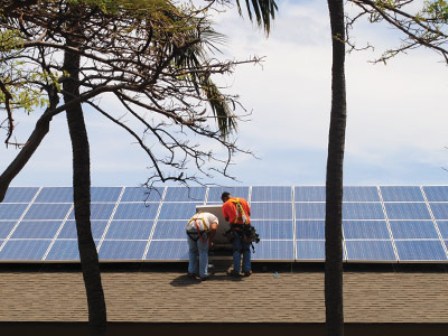Story by Heidi Pool
 Converting to solar energy is smart for the environment, and a smart investment for your home. Since a solar system can cost $5,000 to $50,000 or more, choosing the right company can help you make the right decisions for your budget, energy needs and location. We asked Jim Whitcomb, founder and CEO of Haleakala Solar, what questions an empowered consumer should ask prospective solar dealers.
Converting to solar energy is smart for the environment, and a smart investment for your home. Since a solar system can cost $5,000 to $50,000 or more, choosing the right company can help you make the right decisions for your budget, energy needs and location. We asked Jim Whitcomb, founder and CEO of Haleakala Solar, what questions an empowered consumer should ask prospective solar dealers.
1. How long has your company been in business?
“Many solar companies have entered the market in the past few years, because there’s little capital investment required, and few barriers to entry,” Jim says. “Quality of workmanship and longevity of the system are crucial for an investment such as this, which pays off over time.” Most companies offer a ten-year warranty on workmanship and a twenty-five-year warranty on materials—but that’s only good if you choose a firm with a proven track record, one that’s likely to be around to address any future issues.
2. Can you provide references?
Naturally, companies want you to talk with customers who are completely satisfied with their work. Jim suggests asking for the name and phone number of a customer who experienced problems with the installation or the system itself, to find out how the company resolved those issues. Choose a company that stands behind both its workmanship and materials.
3. What licenses and insurance does your company possess?
This is one of the most important questions to ask. “A lot of companies do not have contractor’s licenses,” Jim says, “and the only way you can get contractor’s liability insurance is if you’re licensed.” In addition, only licensed contractors can obtain a workers’ compensation policy. If a company doesn’t have these insurance policies in place, you as the homeowner could be liable for an on-the-job injury. Ask for a copy of the company’s liability and workers’ compensation policies before signing on the line, Jim says.
4. Do you operate out of a commercial facility?
At the very least, a solar dealer should operate from an office with warehouse space. Better yet is one with support staff and at least one factory-trained technician. Some solar-panel manufacturers ship products directly to customers’ doorsteps, eliminating the need to warehouse any inventory. But Jim advises against purchasing from a company that can’t afford to warehouse inventory. Search out dealers who exhibit financial strength today, which increases the likelihood they’ll be around tomorrow.
5. Who will service my solar system?
While a reputable solar contractor will test all modules before installing them, panels can sometimes have minor defects from manufacturing, or damage from shipping or handling, that may not become apparent until a few years down the road. Ask whether the company you’re considering has trained service personnel who can troubleshoot a system and repair a defective panel—or deal with returning it to the manufacturer and installing a replacement.
6. Will your company handle all the required work?
“Beware of solar companies that hire subcontractors,” says Jim. “This can make it difficult to track accountability, should an issue arise.” Make sure you’re satisfied with who’s going to install it, the quality of workmanship, your potential liability as the homeowner, and who’s going to service the system in the long term.
7. What about tax credits?
Although guidelines vary from state to state, Jim says it’s crucial to ask how many separate photovoltaic systems will be configured from the total number of panels installed on your roof. The Federal government offers a 30 percent tax credit for each solar system; Hawaii offers an additional 35 percent tax credit, with a maximum of $5,000 per system. “Let’s say a company installs twenty-four solar panels in four systems of six panels each, telling you it’s to ‘maximize tax credits.’ There are occasions when it’s appropriate to divide panels into multiple systems. But if panels are grouped into separate systems when there’s no legitimate reason to do so, and your tax return is audited, you’ll have underpaid your taxes and be penalized—with interest—or even be disallowed from taking any credits whatsoever.” Tax authorities are aware of how tax credits can be abused, and reserve the right to inspect any installation of two or more systems. You can download—or ask the solar company to provide—Tax Information Releases 2010-02 (http://www6.hawaii.gov/tax/tir/tir10-02.pdf) and 2010-03 (http://www6.hawaii.gov/tax/tir/tir10-03.pdf). These define what the State considers a “system” for tax purposes. Your tax preparer can also contact the State if he or she has questions.
8. Where should I install a solar system?
“On Maui, the south-facing roof is the ideal place to install a solar system,” says Jim, “though in Hawaii, even the north-facing side will yield 50 to 90 percent of the energy, depending on the angle of the roof. Shade from trees or other buildings can reduce the system’s efficiency; your contractor should be able to determine how much. And be sure to take into account any restrictions your homeowners’ association may have on panel placement.
9. Who deals with inspections and approvals from the electric company?
Licensed contractors make sure the systems they install pass inspections, so you don’t have to. Nor should you have to make a final payment to the contractor until County of Maui inspectors have approved your system.
10. What about credits on my electric bill?
Once your new solar system is installed, your meter will go backwards during months you produce more energy than you consume, and you’ll receive a credit on your electric bill. During cloudy and rainy months, you’ll use some, maybe all of your credits. This is referred to as “net metering.” Before having a system installed, “inform your solar company about any expected changes that will affect future energy needs,” Jim says. These can include building an addition, purchasing new energy-efficient appliances, or having members of the household move away. “It’s important to take everything into account when designing a solar system, because electricity credits expire at the end of each year. There are no rollover kilowatt hours.”





